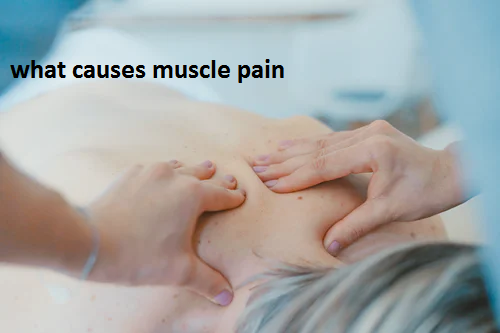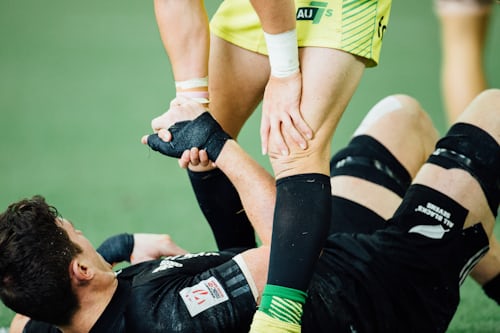Myalgia| What causes muscle pain
Muscle pain is not uncommon, and almost everybody has sometimes felt it. As our, all body parts are consist of a large portion of muscles, and any activity or injury might cause muscle pain. Although, there may be different reasons for muscle pain. So, what causes muscle pain?
Table of Contents
What causes muscle pain?
The people who experience muscle pain, often have stress, tension, or overuse of the muscle in some physical activity. Muscle pain isn’t a highly severe condition until it doesn’t interfere with your daily tasks.
Common causes include:-
- Muscle tension in body parts
- Excessive physical activity
- Injury in muscle during any physical exercise or work
- Not doing workups before a workout
- Lack of sleep
- Dehydration
- Nutrition deficiency
Also read| what are sleep disorders: Symptoms, treatment, and diagnosis
Or any underlying medical condition may be the reason for so.
Not all myalgia or muscle pain condition come from stress and tension. Some other conditions.
Medical conditions for causing muscle pain
- Fibromyalgia,
- Some bacterial infections, and flu
- Chronic pain syndrome
- Thyroid issues like hypo or hyper hypothyroidism
- Autoimmune diseases like lupus, polymyositis, dermatomyositis
- Use of specific medications or drugs like ACE inhibitors, and cocaine
- Low potassium levels
- Arthritis
- Anemia
When it comes to treatment, medicine should be preferred after applying home care. Not all conditions will result in severe disease. If so, then talk immediately to your doctor about the symptoms. There is some home care for muscles you should follow before running to any medical treatment.
Symptoms of muscle pain
- Feeling weakness and stiffness in the affected part
- Laziness
- Non-active
- Redness and inflammation
- Sometimes, fever
- Rashes
Home care for muscle aches
Home care or remedies often work well in cases of muscle pain. You can rely on home care for mild exercise pain to injury pain. There is a R.I.C.E method of home treating the aching.
- R- rest:- give rest to the affected part of the body, and skip activity that has caused it escort
- I- ice:– use an ice pack to apply over the muscles for 15-20 minutes, at least 3 times a day. It will help in relieving pain and inflammation.
- Compression:- compression bandage helps in reducing swelling
- E- elevation:- elevating feet also helps in minimizing inflammation
Other home treatments
- Well, if the pain is unbearable, take an OTC pain killer, such as ibuprofen.
- Try stretching exercises for the affected part
- Practice some peaceful exercise like yoga for the relief of stress and tension
Also read| Amazing gadgets to relieve stress
Precautions while having muscle pain
- Take it easy and gently stretch the muscles
- Avoid high-level physical activities
- Don’t lift the heavyweight until the pain is gone
- Take sufficient rest
Sometimes the symptoms stay for more than a few weeks and make the person irritated and stressed. In this case, an immediate diagnosis is a must. ماكينات القمار Let’s talk about when it’s compulsory to see a doctor.
When to see a doctor
Though muscle pain is treatable and manageable, the presence of any underlying medical condition wants an instant action.
You should go to your doctor:-
- When pain stay consistent for more than a few days, even after home remedies
- When muscle pain cause without any clear cause
- If you feel, redness and swelling along with the pain
- when pain killers don’ work and pain comes soon
- If pain is accompanied by fever
Emergency conditions for muscle pain
One should go hospital immediately if they experience these signs:-
- Sudden reduction in urine
- Vomiting and fever
- Difficulty in breathing
- Difficulty in swallowing
- Stiffness of the affected part
Prevention from myalgia
- Stretching:- don’t forget to do stretching before running into physical activity or workouts.
- Take breaks during sessions of heavy exercises, thus, cooldown yourself.
- Keep yourself hydrated, while having an active routine.
- Practice regular exercise to tone up the muscles.
- If you do a sitting job, then give yourself short breaks to relax your muscles and avoid stiffness.
Conclusion
What causes muscle pain? Muscle pain can be caused by some common symptoms such as excessive physical activity, stress, and injury to severe medical conditions like arthritis, auto-immune diseases, imbalanced thyroid levels. However, the symptoms are manageable by home care and medical treatment. Try to avoid medicines if the symptoms aren’t severe. Take proper rest and use an ice pack over the affected area to relieve the inflammation. If the symptoms last for days even after immediately approach a doctor.
Frequently Asked Questions
What disease causes muscle pain?
Various factors are contributing to muscle pain such as autoimmune diseases, neuromuscular disorders, infections, injuries, and medications.
Autoimmune disease:- the body cells start affecting their own cells mistakenly and self destroy the body tissues and causes muscle pain as a consequence. For example lupus, multiple sclerosis, inflammatory myopathies.
Infections:- some bacterial or viral infections make you feel exhausted due to intense pain in muscles and you may also feel fever, nausea, and swollen lymph. The types of infection that may cause myalgia are cold, flu, Lyme disease, malaria, and trichinosis.
Injuries:- myalgia or muscle pain may also happen due to repeated overuse of the muscle during exercise for a long time. There are several injuries that contribute to muscle pain like:-
- Abdominal pain
- Broken bones or traumatic injuries
- Back strains
- Tendinitis
- Tendinosis
Neuromuscular disorders:- sometimes damage or dysfunctioning of nerves that control muscles can cause muscle fatigue that later becomes severe disorder myalgia. The conditions include:-
- Muscular dystrophy
- Myasthenia gravis
- Amyotrophic lateral sclerosis
Medications:- some medicines and therapies may cause you temporary or long-term pain. This happens due to the inflammation medicines cause around the cells.
Those medications include:-
- Chemotherapy or radiation therapy
- Anti-hypertensives
- Statins for lowering cholesterol levels
How do you treat muscle pain?
A permanent treatment is challenging, but the symptoms can be managed with some home remedies and over-the-counter medicines. You can suppress the symptoms of myalgia by following:-
- Rest the painful area with little movements
- Apply ice packs alternatively to overcome inflammation and heat
- Take a warm shower
- Take over-the-counter painkillers such as aspirin, Tylenol, and ibuprofen.
- You can try some alternative therapies such as massage and acupuncture.
When should I be worried about muscle pain?
If the muscle pain occurs along with weakness, fatigue, and tenderness with trouble sleeping and emotional breakdown it’s time to consult a doctor. People often feel it difficult to concentrate on their daily tasks and avoid going outside due to embarrassment and extreme fatigue. A lot of people deal with emotional distress and depression as an effect. One should not ignore such symptoms and take medical help.
What does muscular pain feel like?
Muscle pain caused without any known symptom feels like a cramping, burning, stabbing along with extreme fatigue and inability to sleep and continuing daily life tasks. However, the diagnosis takes over with the physical examination, imaging tests, and blood tests. The doctor identifies the condition by applying pressure on the tender points, which are the particular points that spread the pain all over the body.
What is best medicine for muscle pain?
Well, medicine will overcome your pain and inflammation but won’t treat the exact cause. Doctors also recommend some mild pain killers for regular severe pain such as NSAIDs including aspirin, paracetamol, Advil, and naproxen. Although these are the safest pain killers, regular use may be harmful. Certain home methods like ice packs are also good as alternative methods. Don’t self-medicate yourself in severe conditions rather take the doctor’s advice.
Which oil is best for muscle pain?
Massages with some essential oils put a great impact on reducing pain. Some of them include lavender oil, chamomile oil, eucalyptus oil, peppermint oil, yarrow oil. Ensure you don’t apply essential oils directly to sore muscles, rather dilute it with some carrier oils such as olive oil, coconut oil, argan oil, and others. A general rule of massaging with essential oil is to combine 6 tbsp of carrier oils with 15 drops of essential oils.
What’s the difference between muscle pain and bone pain?
Bone pain is more severe than muscle pain and often results from an injury or bone infection such as osteomyelitis or tumors. While muscle pain arises as a result of a changed pattern of nerve controlling muscles and causes unbearable pain. Or else any other medical conditions like autoimmune disease and others. Bone pain is however deeper and penetrating.
What drinks help sore muscles?
Ginger tea is great for sore muscles, ginger being anti-inflammatory reduces inflammation. Green tea is also beneficial in stimulating blood circulation and muscle regeneration. Coffee is also on the list of helping sore muscles, athletes take coffee before their workout and are less prone to muscle soreness or cramps.
How long does muscular pain last?
Muscle pain usually stays for a short-term and goes on its own, when the cause isn’t severe and happened due to overuse of muscles or any injury. When the reason is severe such as neuromuscular issues or autoimmune disease it may stay for a lifetime. Although the symptoms will be managed by certain depressants and painkillers, pain may last for a long time. Hence, a proper diagnosis and accurate identification of the condition is compulsory when the symptoms aren’t normal.
Can a pulled muscle hurt for months?
Pulled muscles may hurt you for a few months if done harshly. سباق حصان But it can be recovered properly. العاب فلوس حقيقية Usually, the pain let go within a few weeks and a harsh pull or injury may take a few months too. Also, the healing will be promoted by regular massaging, painkillers, and rest.




